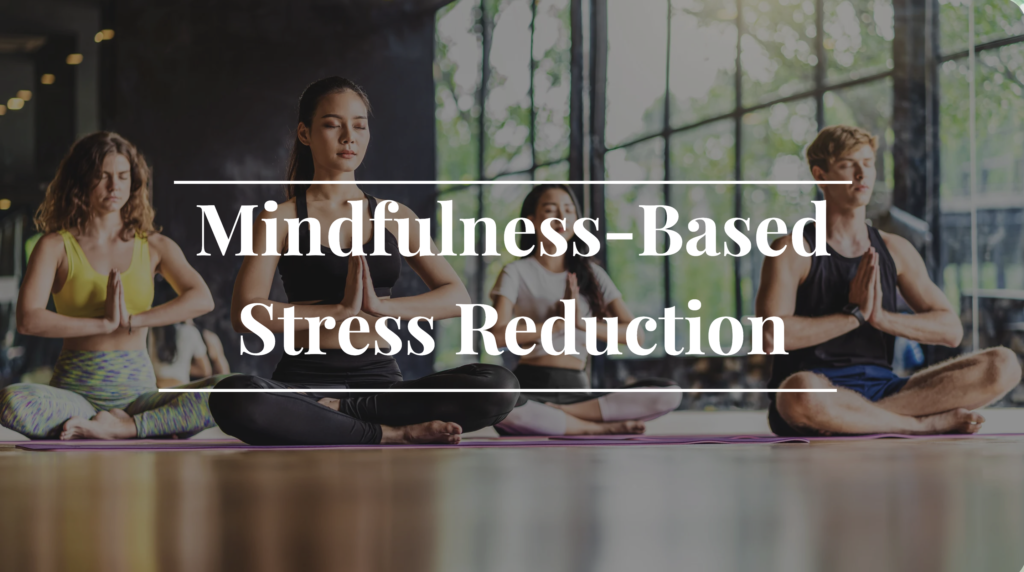Mindfulness-Based Stress Reduction (MBSR): Simple Daily Practices for a Calmer You
Life can be stressful, right? Be it school, work, family issues, or just the challenges of everyday life, stress seems to find us all.
But what if there was a way to manage stress that didn’t involve complicated therapies or expensive treatments? Enter Mindfulness-Based Stress Reduction, also known as MBSR.
MBSR is a simple, proven way to reduce stress by paying attention to the present moment in a mindful way. Developed by Dr. Jon Kabat-Zinn in the late 1970s, this practice has helped thousands of people reduce their stress as well as improve their well-being. And the amazing part is, it involves easy-to-learn practices that anyone can do, no matter their age or experience.
What is Mindfulness-Based Stress Reduction (MBSR)?

MBSR is an 8-week program that teaches mindfulness meditation as a way to deal with stress, pain, and illness. Mindfulness simply means paying attention to what’s happening right now, without judging it or getting lost in your thoughts. Instead of worrying about the future or regretting the past, mindfulness brings your focus back to the present moment.
The MBSR program was created by Dr. Jon Kabat-Zinn at the University of Massachusetts Medical Center in 1979. Originally, it was designed to help people dealing with chronic pain, but over time, it became clear that MBSR could also reduce stress and improve overall mental health. Today, it is used worldwide to help people manage stress, anxiety, depression, and even physical health problems.
Jon Kabat-Zinn’s Work on Mindfulness-Based Stress Reduction

Jon Kabat-Zinn is the founding father of Mindfulness-Based Stress Reduction (MBSR), as he created the practice in the 1970s.
He used a fresh, science-based way to look at old Buddhist ideas of mindfulness and meditation, creating a simple method to help lower stress.
MBSR first started at the Stress Reduction Clinic at the University of Massachusetts Medical School, where Jon Kabat-Zinn was a professor of medicine.
Back then, the program he created was called the Stress Reduction and Relaxation Program, but later it was renamed to Mindfulness-Based Stress Reduction.
When the name got changed, there was a shift in perspective too, from highlighting its Buddhist roots to making the program more open to everyone, no matter their beliefs. Jon Kabat-Zinn saw mindfulness as a practice that anyone could do, and MBSR supports this idea by letting people make it their own.
His work with MBSR helped create a positive shift towards acceptance and awareness in a world full of stress. But what might last the longest is his idea that mindfulness is for everyone.
Seven foundational attitudes for stress reduction

According to Kabat-Zinn, there are seven foundational attitudes for stress reduction which are important in the practice of mindfulness:
- Letting go: Let go of trying to control everything. Relax and join in the moment just as it is.
- Non-judgment: Try to watch things like a fair, friendly observer, without saying if they’re good or bad.
- Patience: Be wise by giving yourself time to go through stuff without rushing. Let things happen at their own pace.
- Beginner’s mind: Pretend everything is brand new, like seeing it for the first time, even if you’ve done it before.
- Trust: Believe in yourself and listen to what you know inside. You’ve got your own good ideas!
- Non-striving: Don’t always feel like you have to reach a goal. Sometimes it’s okay to just be and see what happens.
- Acceptance: Take things as they are, without wishing they were different or imagining the worst. Just go with what’s real right now.
How Does Mindfulness-Based Stress Reduction (MBSR) Works?

MBSR works by teaching simple, daily mindfulness practices. These practices include:
- Mindful Breathing: Paying attention to your breath as it comes in and goes out, helping you focus and calm down.
- Body Scan: Noticing sensations in different parts of your body, which helps you relax and connect with your physical self.
- Mindful Walking: Paying attention to the movement of your body as you walk, helps you stay present.
- Mindful Eating: Eating slowly and savouring each bite, allowing you to fully experience your meal and prevent overeating.
- Sitting Meditation: Sitting quietly and focusing on your breath, body sensations, or thoughts without judgment.
These practices help you break the cycle of stress by training your brain to stay in the present moment rather than getting lost in worry or overwhelmed.
The Science Behind Mindfulness-Based Stress Reduction (MBSR)
You might be wondering, “Does MBSR really work?” The answer is yes, and there’s a lot of scientific research to back it up. Here are a few studies that show how MBSR can help reduce stress and improve health:
1. Reducing Stress
A study published in the journal Health Psychology found that MBSR significantly reduced stress levels in participants. Researchers noticed that people who practised mindfulness regularly had lower levels of the stress hormone cortisol. Lower cortisol means you feel less stressed and anxious.
2. Helping with Chronic Pain
For people suffering from chronic pain, MBSR offers a way to manage their pain without relying on medications. A study published in The Journal of Pain found that people who practised MBSR had reduced pain severity and improved quality of life. This is because mindfulness helps you shift your attention away from the pain and reduces your emotional response to it.
3. Boosting Immune System
Practicing MBSR can even improve your immune system. A study published in Psychosomatic Medicine found that mindfulness meditation increased activity in the immune system, making people more resistant to illness.
Benefits of Mindfulness-Based Stress Reduction

Now that we’ve looked at the science, let’s explore how MBSR can make a real difference in your life. Here are some proven benefits:
1. Reduces Stress and Anxiety
By focusing on the present moment, mindfulness helps you stop worrying about things you can’t control, like the future or the past. This helps reduce feelings of stress and anxiety.
- Fact: Studies show that MBSR reduces the stress hormone cortisol, helping you feel calmer and more relaxed.
2. Improves Focus and Attention
Mindfulness trains your brain to stay focused on one thing at a time. This can help improve your concentration and make it easier to get things done.
- Fact: Research from Harvard University found that people who practice mindfulness have improved attention and better working memory.
3. Helps You Sleep Better
Stress often keeps us awake at night, which makes it hard to get a good night’s sleep. MBSR helps calm your mind and body, making it easier to fall asleep and stay asleep.
- Fact: A study published in JAMA Internal Medicine found that MBSR improves sleep quality and helps reduce insomnia.
4. Enhances Emotional Well-Being
Mindfulness helps you understand and accept your emotions without being overwhelmed by them. This means you can handle difficult situations with more emotional balance and less frustration.
- Fact: A study from Psychological Science found that mindfulness increases positive emotions and decreases negative thoughts.
5. Strengthens Relationships
When you practice mindfulness, you become more present with others. This can improve your relationships by making you a better listener and more understanding
.Fact: Research shows that mindfulness improves empathy and helps reduce conflicts in relationships.
How to Practice Mindfulness-Based Stress Reduction in Your Daily Life
You don’t need to be an expert to start practising MBSR. You can begin with a few simple mindfulness exercises. Here are some easy ways to practice mindfulness:
1. Mindful Breathing
- Find a quiet place to sit or lie down.
- Close your eyes and take a deep breath in, then slowly breathe out.
- Focus on your breath as it moves in and out of your body.
- If your mind wanders, gently bring your attention back to your breath.
You can do this for just 5 minutes each day, and it will help calm your mind.
2. Body Scan Meditation
- Lie down or sit comfortably.
- Close your eyes and take a few deep breaths.
- Focus your attention on different parts of your body, starting from your toes and moving up to your head.
- Notice any sensations, like warmth, tension, or tingling, without trying to change them.
This practice helps you relax and become more aware of your body.
3. Mindful Walking
- Find a quiet place to walk, like a park or your backyard.
- As you walk, focus on the movement of your feet and legs.
- Pay attention to how your body feels with each step.
- Notice your surroundings like trees, sky, or the sounds around you.
Mindful walking is a great way to practice mindfulness while being active.
4. Mindful Eating
- The next time you eat, take a moment to look at your food.
- Notice the colours, textures, and smells.
- Take small bites and chew slowly, focusing on the taste and texture of each bite.
- Pay attention to how your body feels as you eat.
Mindful eating helps you enjoy your food more and can prevent overeating.
Common Challenges in Practicing MBSR and How to Overcome Them
1. “I Can’t Stop My Thoughts”
It’s normal to have thoughts while meditating. The goal isn’t to stop your thoughts but to notice them without getting caught up in them. When a thought pops up, just acknowledge it and gently bring your focus back to your breath.
2. “I Don’t Have Time to Meditate”
You don’t need a lot of time to practice mindfulness. Even 5 minutes a day can make a big difference. Try adding mindfulness practices to your daily activities like eating, walking etc.
3. “I Feel Restless”
Restlessness is something that is seen in many people nowadays from children to working professionals. And if sitting in one place for a longer time feels uncomfortable, try mindful walking. Walking slowly and paying attention to your movements can help calm your mind without sitting in one place.
Conclusion
Mindfulness-Based Stress Reduction offers a simple, effective way to reduce stress and improve your well-being. By practising mindfulness, you can train your brain to stay present, improve your mental and physical health, and handle stress more effectively.
Whether you’re feeling overwhelmed by stress or just want to feel more peaceful in your daily life, MBSR is a tool you can easily incorporate into your routine. The best part? It’s backed by science, and anyone can do it!
Start small, stay consistent, and soon you’ll begin to notice the benefits of mindfulness in every aspect of your life.
References:
- Shields, G. S., et al. (2017). Health Psychology: Effects of mindfulness on cortisol levels.
- Cherkin, D. C., et al. (2016). The Journal of Pain: Mindfulness and chronic pain management.
- Davidson, R. J., et al. (2003). Psychosomatic Medicine: Mindfulness meditation and immune system improvement.






